 Petzlover
Petzlover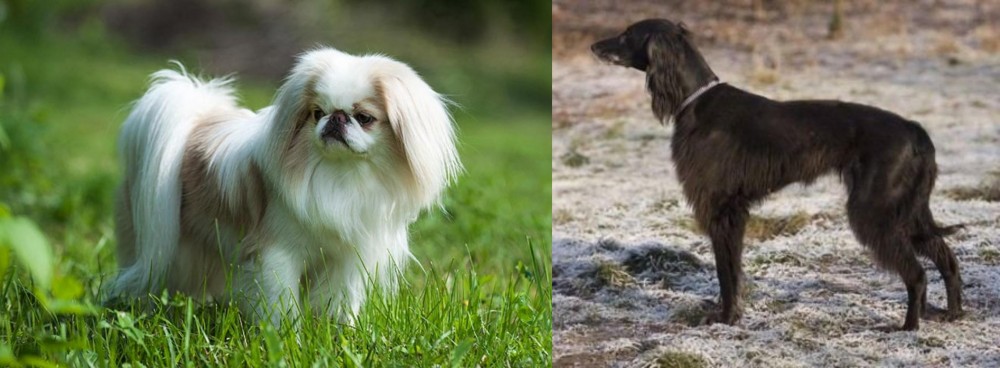 Japanese Chin is originated from Japan but Taigan is originated from Kyrgyzstan. Japanese Chin may grow 55 cm / 21 inches shorter than Taigan. Japanese Chin may weigh 28 kg / 61 pounds lesser than Taigan. Both Japanese Chin and Taigan has almost same life span. Japanese Chin may have less litter size than Taigan. Japanese Chin requires Moderate Maintenance. But Taigan requires Low Maintenance
Japanese Chin is originated from Japan but Taigan is originated from Kyrgyzstan. Japanese Chin may grow 55 cm / 21 inches shorter than Taigan. Japanese Chin may weigh 28 kg / 61 pounds lesser than Taigan. Both Japanese Chin and Taigan has almost same life span. Japanese Chin may have less litter size than Taigan. Japanese Chin requires Moderate Maintenance. But Taigan requires Low Maintenance
 The Japanese Chin, also known as the Japanese Spaniel, has always been known for thousands of years as a dog with strong companion characteristics.
The Japanese Chin, also known as the Japanese Spaniel, has always been known for thousands of years as a dog with strong companion characteristics.
Hailing from Asia, he is also known as the Japanese Spaniel. In Japan, the Chin dogs are royalty and lapdogs, and while the exact origin of the Japanese Chin isn't quite clear, it is an ancient toy breed.
The first Japanese Chin was brought to America in 1882. The toy breed was recognized by the American Kennel Club in 1888, as a Japanese Spaniel. The AKC changed the breed name to the Japanese Chin in 1977.
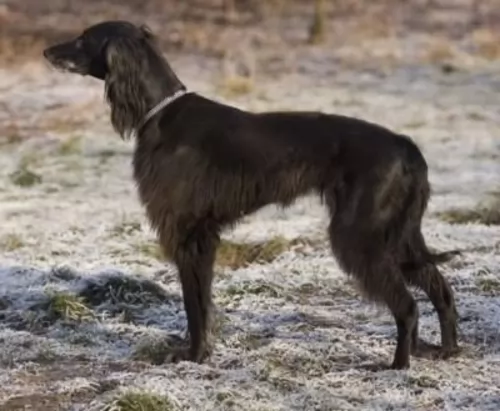 Known also as the Kyrgyzdyn Taighany, the Taigan is a sighthound dog from Kyrgyzstan. Today the dog is recognized by a number of kennel clubs,and more recently by the FCI.
Known also as the Kyrgyzdyn Taighany, the Taigan is a sighthound dog from Kyrgyzstan. Today the dog is recognized by a number of kennel clubs,and more recently by the FCI.
It was after 1991, when Kyrgyzstan became independent, that the role of the dog changed and t became a working dog again.
It was about in 1995 that a new breed standard was adopted, and since 2005 a national kennel club has existed in Kyrgyzstan.
 As a small sized dog, the oriental looking Japanese Chin stands at about 20 to 27cm in height and weighs roughly 2 to 6kg. He has a large round head with big brown eyes and a short muzzle. The ears are long and feathery and the tail is long and held up over the back.
As a small sized dog, the oriental looking Japanese Chin stands at about 20 to 27cm in height and weighs roughly 2 to 6kg. He has a large round head with big brown eyes and a short muzzle. The ears are long and feathery and the tail is long and held up over the back.
The long silky single coat is either white and red or white and black or it can be tri-colored too – white, black and reddish-tan.
The Japanese Chin is a small, evenly tempered dog and the toy-size dog, according to people who have owned him as a pet, say he has some cat-like features – the ability to leap and the ability to wash himself similar to what a cat does.
He is also a typical lap dog liking nothing more than to lie in your lap and be petted. He just loves being with his human family and his smallness allows him to fit well into city- or country life.
He is an intelligent dog. He is small but strong-willed and that is why both you and him will benefit from having him trained and socialized as he becomes more amicable and obedient.
Social, jaunty and content, he is everyone’s friend and will be a suitable playmate for children, being loving and devoted to his entire family. They make great therapy dogs as he has the knack of being sensitive to the feelings of people and adjusts his mannerisms to suit the people he is with.
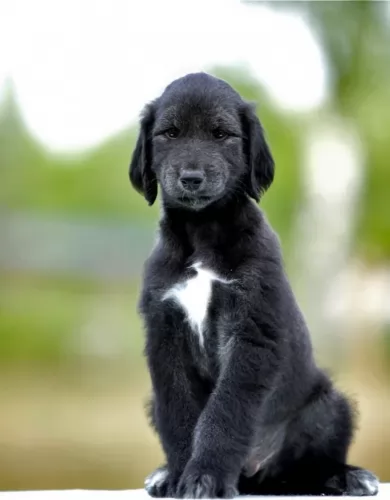 The Taigan is a large dog, looking much like a Grehound. He stands at between 55 and 82cm in height and weighs about 25 - 34kg.
The Taigan is a large dog, looking much like a Grehound. He stands at between 55 and 82cm in height and weighs about 25 - 34kg.
He has that typical slender body and slender head of the greyhound. The coat of the dog is medium length and somewhat curly and can be many colours, sometimes even bi-colored – cream, black and white, brown, grey or yellow.
During the Winter the coat can become long and thick. The ears are floppy and covered with wavy fur. The tail is long and a distinguishing mark of the dog is the way the end of the tail coils up into a ring.
These dogs can’t be kept in small city properties – they are used to wide open spaces.
An intelligent breed, the Taigan will readily learn some basic commands to make him well mannered and obedient. He is strong willed and independent, so it will be beneficial to have him trained.
He also makes a good watchdog. He is an even-tempered dog and he enjoys human companionship although he is somewhat reserved with strangers. Even so, he will still need a strong, firm owner as he is strong-willed and independent and likes to go his own way.
He is able to get along well with children in the home and other pets. Being a fairly large dog, and one that likes to run, he is better suited to large properties in the countryside as opposed to living in the city.
 The Japanese Chin is just longing to be your special friend. When you treat him with the love and care he deserves, you'll discover that he is a sweet, gentle companion who will be loyal and loving to his human family.
The Japanese Chin is just longing to be your special friend. When you treat him with the love and care he deserves, you'll discover that he is a sweet, gentle companion who will be loyal and loving to his human family.
He is a quiet pet and intelligent enough to be trained and socialized so that he is obedient and ready to please. Although he doesn't bark much, he makes quite a few other noises such as wheezing, snorting and snorting. He makes up for it by being entertaining and loving towards you so that you life is brighter just by having him in it.
 There are a few health issues with your Japanese Chin that are worth knowing about such as hypoglycemia, cataracts and heart murmurs. Allergies and dental issues also need to be checked.
There are a few health issues with your Japanese Chin that are worth knowing about such as hypoglycemia, cataracts and heart murmurs. Allergies and dental issues also need to be checked.
Dog breeds with the flattened face always battle with dental-, eye and breathing problems. With good care however, your Japanese Chin can reach anything from 10 – 12 years of age.
Murmurs come about because of a disturbance in the blood flow and which can produce an audible noise. If your dog's murmur is associated with structural heart disease, your dog may display signs of congestive heart failure and he'll be weak for instance and be coughing.
When your dog gets to the vet, the course of treatment will be determined on the type of heart murmur. Luckily puppies with low grade murmurs often grow out of it but if you have an adult dog, routine diagnostic imaging may be recommended by your vet.
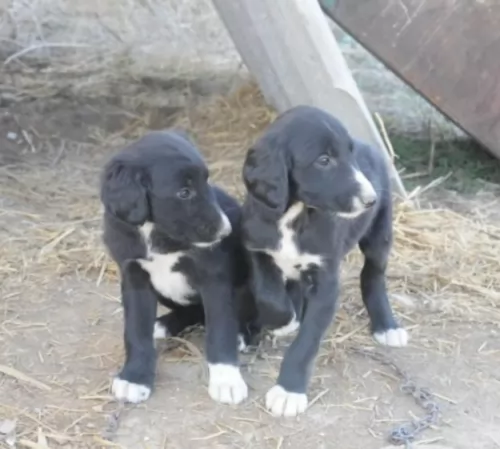 Any dog, no matter how healthy they may appear to be, can encounter any one of the many common dog illnesses there are. It is highly unlikely that your Taigan will experience these health issues but it’s good to be aware of some of them -
Any dog, no matter how healthy they may appear to be, can encounter any one of the many common dog illnesses there are. It is highly unlikely that your Taigan will experience these health issues but it’s good to be aware of some of them -
Also known as osteosarcoma, bone cancer is more commonly seen in large dogs of any breed. It’s a cancer which spreads rapidly through the body and it is terribly sad that the prognosis for your dog is poor.
You might notice swelling, joint pain and lameness and your dog will appear to always be tired. Sometimes you might see a growth. Your vet might do x-rays and if you catch it early, you can give your pet a longer lease on life.
 The Japanese Chin has a single coat, and a brush once or twice a week will keep the coat silky and untangled.
The Japanese Chin has a single coat, and a brush once or twice a week will keep the coat silky and untangled.
Check his ears for dirt and wax and try to wipe inside the ears, being very, very careful not to go deep into the ear to avoid damage.
Clip his nails and brush his teeth as small dogs are more prone to dental disease. Periodontal disease is preventable with dental cleaning. Dental disease starts when plaque sticks to the surface of the teeth. It hardens, spreads under the gum line and cause tissue damage. It also damages the immune system.
The Japanese Chin is an energetic dog and loves a game and a walk. It isn't the kind of dog that you will take on your hikes or swimming as it tends to huff and puff after a while from too much exercise, and more specifically in hot weather.
Dog experts say that a grain-free food is best for this kind of dog. Kibble which comes with lean protein and with plenty of vitamins and minerals such as taurine and carnitine is recommended. They are good for the joints, coat, heart and eyes. Japanese Chins can be prone to heart- and eye problems and kibble rich in omega 3 fatty acids will be good for the Chin for many excellent reasons.
If you're in any way uncertain about what to feed your Japanese Chin, speak to your vet as the type of food you feed your pet will determine how healthy he will be. Always ensure he has access to fresh, cool water.
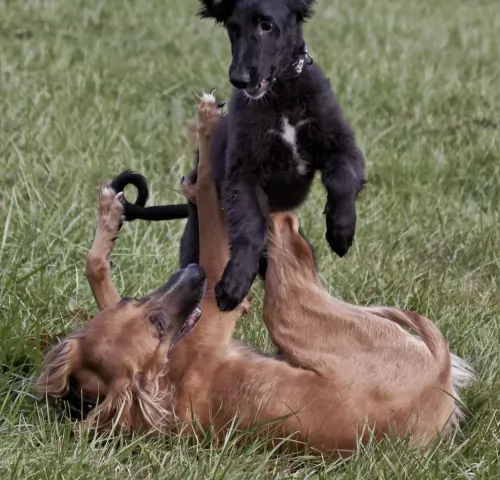 If you feed him one of the commercially manufactured dog foods, make sure its for a large, active dog breed and that it has a good list of ingredients. There are bad packaged dog foods and you want to avoid these. They are devoid of vitamins and minerals.
If you feed him one of the commercially manufactured dog foods, make sure its for a large, active dog breed and that it has a good list of ingredients. There are bad packaged dog foods and you want to avoid these. They are devoid of vitamins and minerals.
Read the packaging to see how much food to give. Also try and give your dog some home-made food too. Make sure it isn’t spicy, exotic foods. Stick to simple, wholesome foods such as boiled chicken, brown rice or pasta, sweet potatoes, spinach and carrots. Chop the food up and mix it into the dry kibble twice a week or so as a treat.